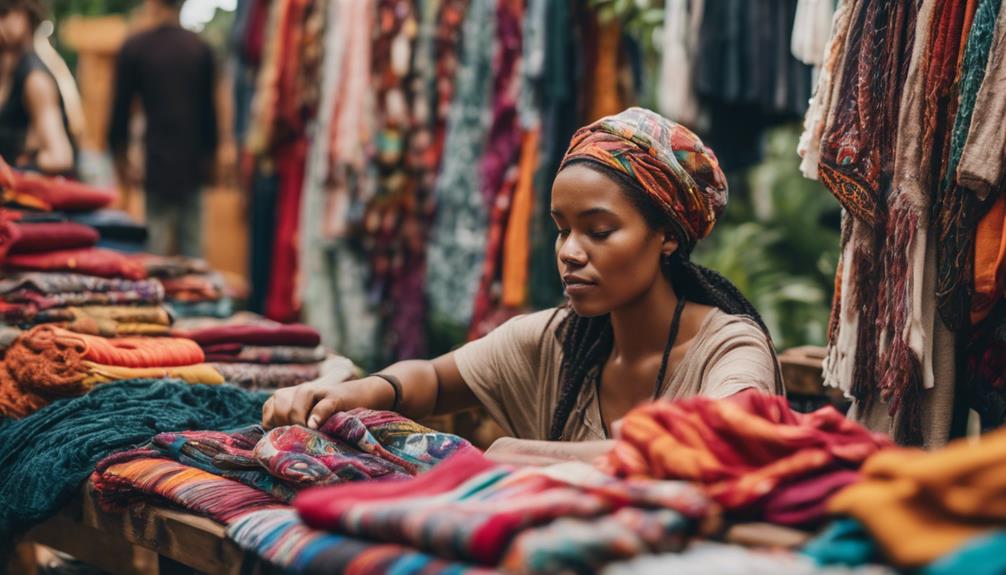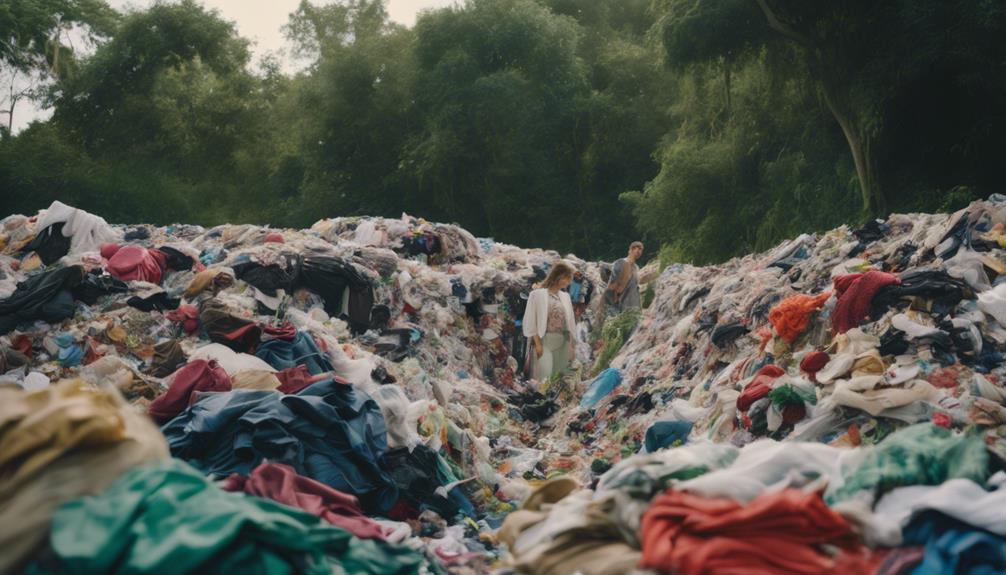Sustainable fashion is good for you and the planet in ways you might not expect! It not only reduces waste and environmental harm but also promotes fair labor practices, ensuring safe working conditions and decent wages for workers. You'll save money in the long run by investing in quality pieces that last, rather than cheap, fast fashion that quickly breaks down. Plus, by supporting ethical brands, you help drive positive change in the industry. Interested in discovering more about how sustainable fashion can transform your wardrobe and contribute to a better world? There's plenty of fascinating info waiting for you!
Key Takeaways
- Sustainable fashion promotes eco-friendly practices, significantly reducing environmental impact and greenhouse gas emissions associated with traditional clothing production.
- It supports fair labor practices, ensuring workers receive competitive wages and safe working conditions, fostering dignity and community engagement.
- Utilizing biodegradable and recycled materials minimizes waste, with innovations like ECONYL® drastically cutting oil usage and CO2 emissions.
- Ethical brands prioritize transparency in sourcing, allowing consumers to make informed choices and drive positive change in the fashion industry.
Understanding Sustainable Fashion
Sustainable fashion primarily focuses on eco-friendly practices and ethical production methods that prioritize quality and longevity in clothing. You'll notice that this movement encourages responsible consumerism, urging brands to adopt transparent sourcing and production processes. By choosing sustainable fashion, you're actively participating in a shift away from the fast fashion model, which often leads to excessive waste and pollution.
This approach emphasizes the use of biodegradable materials like cotton, wool, and hemp, along with recycled fabrics. These choices considerably reduce the environmental impact of clothing production. You'll find that custom menswear and made-to-order clothing minimize textile and energy waste, allowing for higher-quality garments that last longer.
Ethical fashion plays an essential role in this movement, as it guarantees fair labor practices and supports local communities. By understanding these principles, you can make informed decisions about your wardrobe. Each choice you make contributes to a more sustainable future for the fashion industry and the planet.
Embracing sustainable fashion isn't just about looking good; it's about feeling good knowing you're making a positive impact on both the environment and society.
Environmental Benefits

Choosing eco-friendly fashion options not only enhances your wardrobe but also contributes to significant environmental benefits that can help combat climate change. The fashion industry is responsible for up to 10% of global greenhouse gas emissions, making it essential to adopt sustainable practices.
By selecting clothing made from recycled materials, you're playing a vital role in diverting waste from overflowing landfills. Currently, less than 1% of clothing materials are recycled, leading to a staggering annual loss of $100 billion in wasted resources.
Moreover, sustainable practices in fabric production can dramatically reduce water usage. For example, while conventional cotton production consumes about 2,700 liters of water for each T-shirt, organic cotton uses 91% less.
When you choose sustainable fabrics like ECONYL®, you're helping save up to 70,000 barrels of oil and cutting CO2 emissions by 57,100 tons for every 10,000 tons produced compared to conventional materials.
Extending the lifespan of your clothing by just nine months can reduce the overall impact on the environment by up to 30%. By making these mindful choices, you're not only looking good but also doing good for our planet.
Social Impact of Fashion

When you think about sustainable fashion, consider its role in promoting fair labor practices and community engagement.
This movement not only fights for better wages and safe working environments but also supports local economies by creating jobs.
Fair Labor Practices
Fair labor practices in fashion guarantee that garment workers receive fair wages and safe working conditions, directly impacting their quality of life and fostering a more equitable industry.
When you choose to support sustainable brands, you're not just buying clothing; you're actively participating in a movement that values ethical treatment of workers. These brands often collaborate with certified factories that adhere to strict ethical standards, ensuring that workers enjoy safe working conditions and respect for their rights.
The rise of the ethical fashion movement has shed light on the harsh realities of modern slavery and unsafe labor practices in the fast fashion industry. As a consumer, your awareness of these issues is vital.
Studies show that 71% of millennials prioritize sustainability and fair labor practices when making purchasing decisions. By opting for sustainable fashion, you're endorsing brands that advocate for social equity and fair treatment of workers.
This choice not only supports a humane fashion industry but also helps combat poverty and improves the living conditions of those behind the scenes.
Embrace sustainable fashion and be a part of this positive change!
Community Engagement Initiatives
Community engagement initiatives in sustainable fashion create meaningful connections while tackling issues like fashion waste and consumption. By participating in local events such as clothing swaps, you're not only sharing garments but also cultivating a culture of reuse. This helps reduce individual consumption and minimizes the amount of waste generated by fast fashion.
These initiatives often emphasize ethical sourcing, encouraging you to choose local and responsibly made products. Supporting local economies strengthens community ties and promotes responsible consumer behavior. When you engage in these activities, you actively contribute to sustainability efforts, reducing the overall environmental impact of fashion.
Moreover, events that focus on sustainability serve as educational platforms. They raise awareness about the social and environmental consequences of fast fashion, allowing you to make more informed choices. As you learn, you can share this knowledge with others, creating a ripple effect that fosters greater community engagement.
In essence, your involvement in these initiatives not only enhances your social connections but also empowers you to take meaningful action towards a more sustainable future in fashion. By participating, you play a vital role in shaping a more responsible and connected community.
Ethical Considerations

When you think about ethical fashion, consider how fair labor practices and transparency in sourcing impact the lives of workers.
You'll also want to explore cruelty-free alternatives that reflect your values.
Fair Labor Practices
Sustainable fashion focuses on ensuring that workers enjoy competitive wages and safe working conditions, breaking away from the exploitative practices common in fast fashion. By prioritizing fair labor practices, this movement champions ethical standards that protect workers' rights and promote dignity in the workplace.
Here's a quick overview of how sustainable fashion implements these practices:
| Aspect | Fast Fashion | Sustainable Fashion |
|---|---|---|
| Worker Wages | Often below living wage | Competitive, fair compensation |
| Working Conditions | Unsafe, unhealthy environments | Safe, regulated workplaces |
| Rights and Dignity | Frequently violated | Respect for workers' rights |
| Supply Chain Transparency | Limited visibility | Collaboration with certified factories |
| Advocacy | Minimal attention to social issues | Active promotion of humane conditions |
As awareness of labor injustices grows, consumers like you are influencing brands to adopt these fair labor practices. By supporting sustainable fashion, you contribute to creating a more equitable industry that uplifts workers and promotes long-term change.
Transparency in Sourcing
Fair labor practices not only enhance workers' rights but also highlight the importance of transparency in sourcing materials for clothing.
When you choose brands that prioritize transparency in sourcing, you gain insight into the origins of the materials used, fostering trust in the brand's commitment to ethical practices. This transparency guarantees that you can make informed choices about the clothing you buy.
Many ethical brands provide detailed information about their supply chains, including how workers are treated and the environmental impact of their operations. Research shows that 73% of millennials are willing to pay more for sustainable offerings, demonstrating the growing demand for transparency among eco-conscious consumers.
By supporting brands that disclose their sourcing practices, you also contribute to improved labor conditions, as these brands are more likely to implement fair wages and safe working environments.
Moreover, brands that embrace transparency often enjoy higher customer loyalty. When you prioritize ethical consumption, you encourage businesses to uphold strong ethical practices.
In the end, your choices can drive positive change in the fashion industry, making it a more sustainable and ethical space for everyone involved.
Cruelty-Free Alternatives
Increasingly, consumers are seeking cruelty-free alternatives to traditional leather, driven by a desire for ethical considerations in fashion.
You might be surprised to learn that the leather industry is responsible for the slaughter of over 430 million animals every year, raising serious concerns about animal welfare.
Fortunately, innovative materials offer sustainable solutions that align with your values.
Cruelty-free alternatives like pineapple leather and ocean trash polyester are gaining traction in the sustainable fashion sector.
Pineapple leather, made from the fibers of pineapple leaves, repurposes agricultural waste while providing a chic, eco-friendly choice.
Similarly, ocean trash polyester not only reduces reliance on animal products but also tackles ocean pollution.
Practical Shopping Tips

To make a positive impact on the environment, start by exploring thrift and consignment stores for your next wardrobe additions. These places not only offer unique finds but also extend the lifecycle of clothing, reducing landfill waste. When shopping, consider researching ethical brands that prioritize fair labor practices and environmentally friendly production methods.
Investing in quality pieces is essential; timeless garments are less likely to go out of style, ensuring you'll wear them for years to come. To help you navigate sustainable shopping, here's a handy table:
| Shopping Tip | Benefits | Action Items |
|---|---|---|
| Thrift Stores | Unique pieces, reduces waste | Visit local thrift shops |
| Ethical Brands | Fair labor, eco-friendly | Research brand practices |
| Quality Investment | Longevity, less frequent buying | Choose classic styles |
| Clothing Swaps | Community building, reuse | Organize or attend swaps |
| Donation Initiatives | Help others, extend lifecycle | Donate unwanted clothes |
Long-Term Advantages

Sustainable fashion offers numerous long-term advantages, from reduced environmental impact to significant savings on clothing expenses. Here are three key benefits you should consider:
- Environmental Impact: Extending the use of your clothes by just nine months can lead to a 30% decrease in environmental harm associated with production and disposal.
- Cost Savings: Investing in quality sustainable clothing means you buy less often. These durable items last longer, reducing your need for frequent replacements.
- Support for Local Economies: Many sustainable brands prioritize local sourcing and production, helping to create jobs and strengthen community resilience.
Innovations in Sustainable Fashion

Innovations in sustainable fashion consistently push the boundaries of traditional garment production, offering exciting alternatives that benefit both the environment and consumers.
For instance, brands like Patagonia have pioneered the use of recycled polyester fleece made from plastic bottles, showcasing how repurposing waste materials can lead to high-quality apparel. Other innovations in sustainable materials, like ECONYL®, greatly reduce environmental impact by saving 70,000 barrels of oil and cutting down 57,100 tons of CO2 emissions for every 10,000 tons produced.
As the fashion industry grapples with the fact that over 8,000 synthetic chemicals are used in manufacturing—only 16 of which have EPA approval—the need for safer, eco-friendly alternatives becomes more pressing. Moreover, advances in organic cotton farming have led to a remarkable 91% reduction in water usage compared to conventional methods, demonstrating a notable shift toward resource-efficient practices.
Additionally, the rise of clothing rental services allows you to enjoy diverse styles while minimizing waste, making it easier to embrace a sustainable lifestyle. These innovations are reshaping the fashion landscape and encouraging consumers to make mindful choices.
Community Involvement

Community involvement plays an essential role in promoting sustainable fashion, offering opportunities for individuals to connect and take collective action against fashion waste. By engaging with your community, you can make a real difference in the fight against the environmental impacts of fast fashion.
Here are three ways you can get involved:
- Clothing Swaps: Participate in local clothing swaps to reduce consumption while building social connections. It's a fun way to refresh your wardrobe without contributing to fashion waste.
- Workshops and Events: Attend or organize workshops focused on upcycling and repairing clothing. These initiatives foster community engagement and empower you to be creative while combating textile waste.
- Support Ethical Brands: Advocate for and shop from local ethical brands. By building networks around these businesses, you strengthen collective efforts to reduce waste and promote sustainable practices.
Your involvement in these activities not only helps decrease fashion waste but also cultivates a sense of community dedicated to sustainability. Together, you can inspire others and create lasting change in the fashion industry.
Personal Style and Responsibility

Your personal style can reflect your values and commitment to ethical fashion, showcasing unique pieces that stand out from the crowd while supporting responsible practices. By choosing sustainable fashion, you're not just dressing yourself; you're making a statement about what matters to you.
Investing in high-quality, timeless designs over fleeting trends helps you build a versatile wardrobe that lasts, ultimately reducing waste and benefiting the environment. Embracing ethical brands fosters a sense of responsibility, as each purchase contributes to fair labor practices and environmental conservation.
When you prioritize sustainable fashion, you're actively participating in reshaping the industry and encouraging mindful consumption habits. This shift allows you to appreciate the lifecycle of clothing, aligning your personal style with your social values.
Moreover, supporting sustainable fashion brands connects you with a community of like-minded individuals who share your commitment to eco-friendly practices and social equity. Your choices can inspire others, creating a ripple effect that promotes positive change.
Frequently Asked Questions
Why Is Sustainable Fashion Good?
Sustainable fashion's good for you because it reduces waste, supports ethical labor, and conserves resources. When you choose sustainable options, you promote a healthier planet, encourage quality over quantity, and align your values with your purchases. In addition, sustainable fashion also has a positive impact on communities by providing fair wages and safe working conditions for garment workers. By supporting sustainable fashion, you contribute to reducing the harmful effects of the fashion industry on both people and the environment. The sustainable fashion impact can be seen in the long-term health and well-being of our planet and its inhabitants.
What Does Sustainable Fashion Mean to You?
Sustainable fashion means you're choosing clothes that align with your values. It's about investing in quality, supporting ethical practices, and reducing waste, so you can feel good about your wardrobe while helping the planet.
What Are the Positive Effects of Sustainability in Fashion Industry?
Sustainability in fashion reduces waste, conserves resources, and supports fair labor practices. By choosing eco-friendly brands, you're not only making a statement but also contributing to a healthier planet and equitable industry for everyone.
Do People Really Care About Sustainable Fashion?
Yes, people do care about sustainable fashion. You'll find that many prioritize eco-friendly options, with millennials leading the charge. Awareness of the industry's impact drives consumers to seek greener alternatives and support responsible brands.
Conclusion
In the grand tapestry of life, sustainable fashion is a vibrant thread that weaves together our choices and the planet's well-being.
Imagine each garment as a seed planted in the earth—when you choose responsibly, you nurture a future where fashion blooms without harming our world.
By embracing sustainable fashion, you're not just dressing yourself; you're cultivating a garden of positive change.
So, let your wardrobe reflect your values, and watch your impact flourish.









